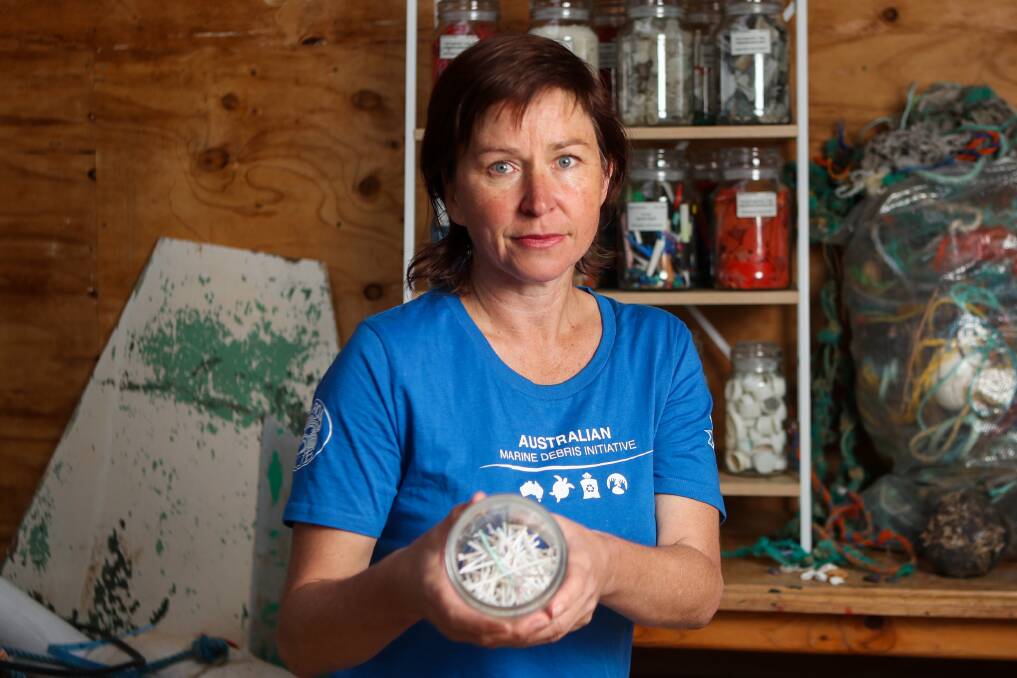
After a four-year environmental campaign to ban cotton buds, Warrnambool's Colleen Hughson is celebrating the end of certain single-use plastic items in Victoria.
Subscribe now for unlimited access.
$0/
(min cost $0)
or signup to continue reading
From Wednesday, single-use plastic drinking straws, cutlery, plates, drink stirrers, cotton bud sticks and expanded polystyrene food and drink containers were banned from sale and supply in Victoria.
Single-use plastics currently make up a third of Victoria's litter and pollute waterways and harm wildlife.
Statewide, the ban will prevent almost 1900 tonnes of plastic entering the environment over the next 10 years and save more than $15 million in clean-up costs.
Ms Hughson founded Better Buds in 2017 to raise awareness of the negative impact plastic-stemmed cotton buds have on the environment.
She said at the time "not even well-known activists that work in the plastic space" had cotton bud bans on their agendas and the group started from "ground zero in terms of raising awareness and getting people onboard".
In 2021 the group helped to convince the state government to commit to banning the sale of plastic cotton buds by 2023. The same year they were finalists in the Keep Victoria Beautiful Tidy Towns awards.
Ms Hughson, who is also a Beach Patrol 3280-3284 volunteer and regularly cleans up the region's beaches and records the littered items collected, said the ban was "absolutely wonderful".
"As someone walking along the beach and seeing never-ending plastics washing up on the beach, at least it's one form of plastic that's no longer washing up on the beaches, that's awesome," she said.
She said around 30,000 cotton buds had been collected along the region's beaches since 2017, with 2000 picked up in the past year.
"It's up to 30,000 now which is pretty horrific," she said
The Beach Patrol group use the LitterStopper app to record their findings and collect and share data, which helping to influence policy makers and protect the environment.
Ms Hughson said plastic straws and cutlery were another "big issue locally" - found mainly in beach car parks - and she was pleased they would be no longer available from this week.
"It's fantastic that's getting phased out as well. We're very pleased," she said.
She said last year the group collected more than 21,000 polystyrene pieces.
"Polystyrene is another forever plastic," she said.
"What we find is when we get big storms and dune erosion, there's a lot of polystyrene in the dunes. Because it's lightweight it seems to travel far.
"It wasn't stuff that was littered. It was stuff that had been in the environment for a really long time.
"It's really exciting to think that parts of it isn't going to be in the environment anymore but there will still be foam packaging and things like that."
She said also causing problems were disposable coffee cups and lids, plastic cups and cigarette butts, which were the "main culprits" found in beach car parks.
Ms Hughson hopes a container deposit scheme to be introduced in Victoria this year will help to reduce the number of plastic drink bottles and lids being littered.
"Plastic bottles are a big problem," she said. "Particularly in the ocean, the bottles that are littered end up breaking up and we get the lids. Lids on the beaches are a huge litter item, going to show lots of these bottles are getting littered."
A Department of Energy, Environment and Climate Action spokesman said it was working with business, industry and other states and territories to continue to reduce plastic pollution.
"Plastic entanglement has been identified as a key factor threatening the survival of many marine species and a key threat to the Burrunan dolphin, a critically endangered species which has known populations in Victorian waters including in Port Phillip Bay," the spokesman said.
The spokesman said the initiative built on the government's successful plastic shopping bag ban in 2019, and was a $515 million investment to transform the waste and recycling system and divert 80 per cent of waste from landfill by 2030.
IN OTHER NEWS
Our journalists work hard to provide local, up-to-date news to the community. This is how you can access our trusted content:
- Bookmark https://www.standard.net.au/
- Make sure you are signed up for our breaking and regular headlines and newsletters
- Follow us on Facebook, Twitter, Instagram and LinkedIn
- Tap here to open our Google News page
- Join our Courts and Crime Facebook group and our dedicated Sport Facebook group
- Subscribe
Have you signed up to The Standard's daily newsletter and breaking news emails? You can register below and make sure you are up to date with everything that's happening in the south-west.


